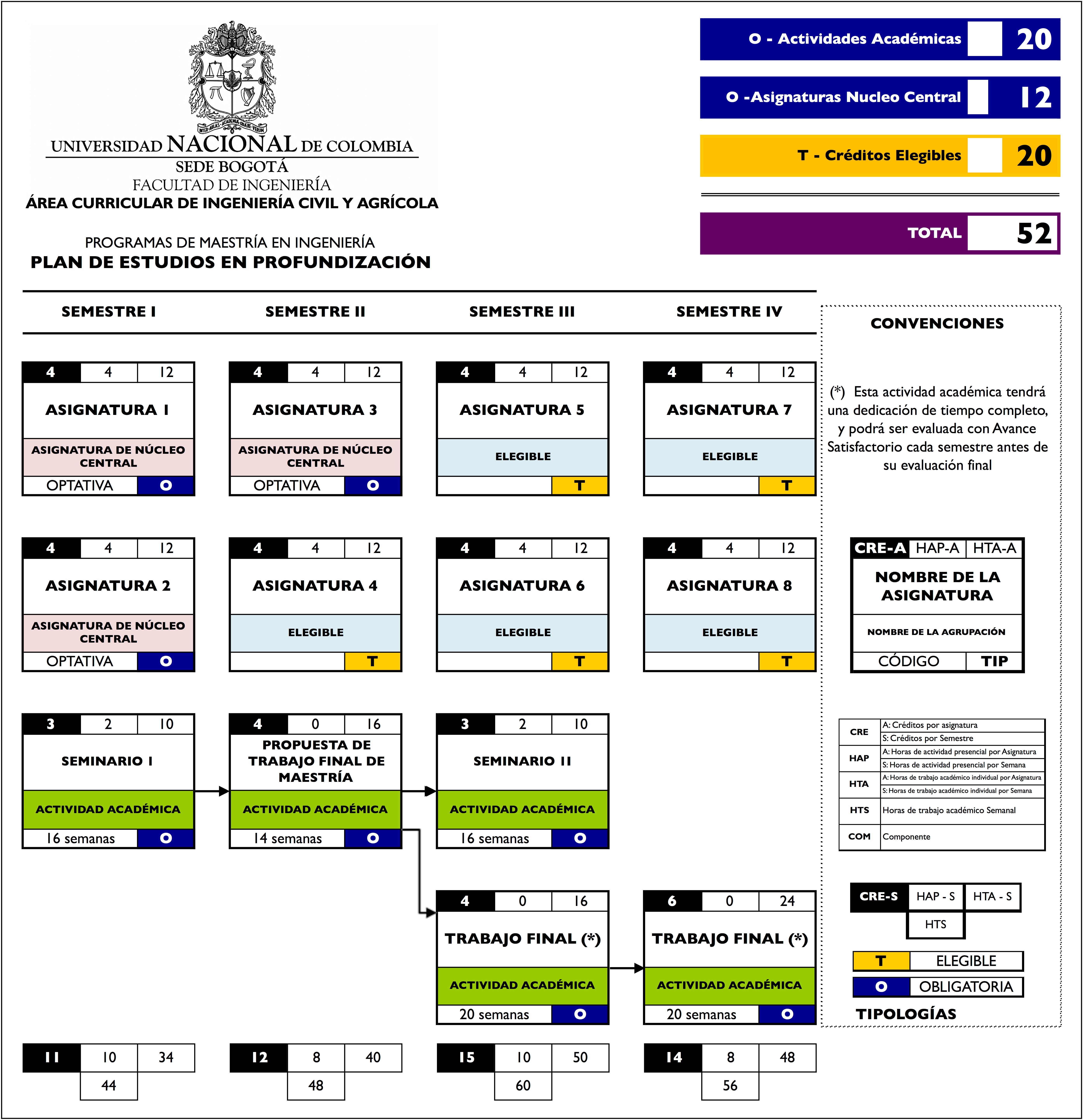MASTER'S DEGREE IN WATER RESOURCES
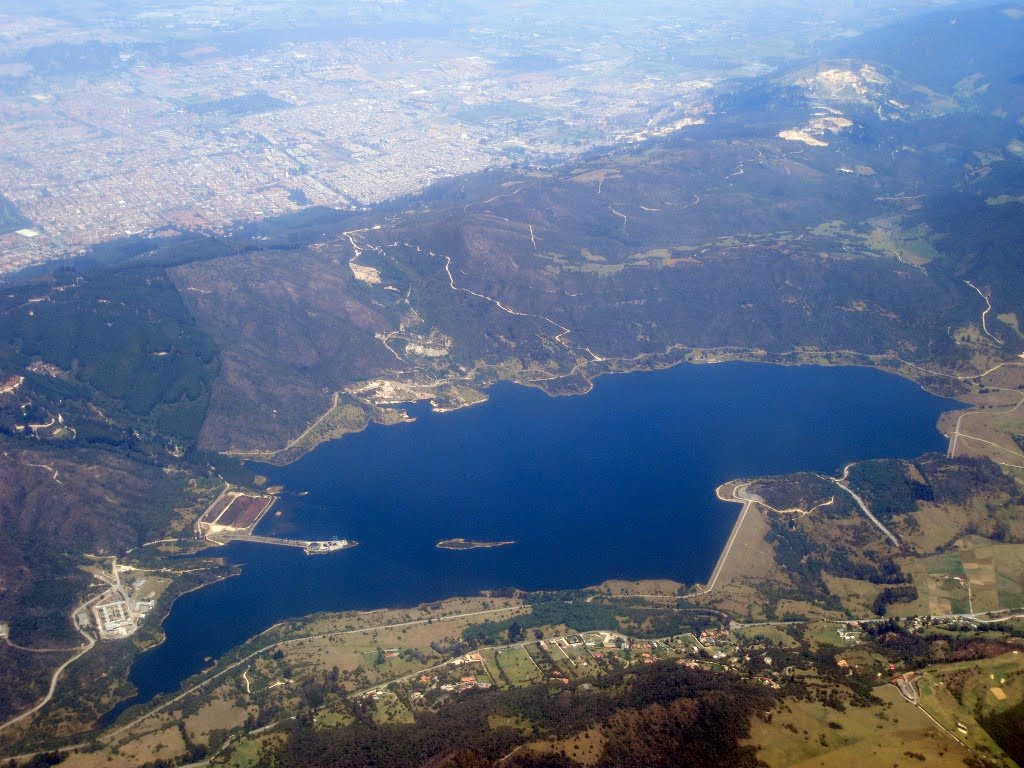
GENERAL INFORMATION
- Education level: Master's degree
- Type of curriculum: Research - In-depth-study
- Academic program: Master's Degree in Engineering - Water Resources
- Title granted: MSc. of Engineering – Water Resources
- SNIES Code 99
- Creation year 1987
- Opening year: 1987
- Campus: Bogotá
- Faculty: Engineering
- Estimated duration: 4
- Total credits: 52
-
Semester tuition described by points:
Academic Fee
Administrative Fee
Welfare Fee
Insurance Fee
155
30
10
26,000 COP
- Point equivalence: currently daily minimum wage for 2020 - ( Circular 1 of 2020 - General Secretariat ) = $29,260 COP
- Approximate tuition for the semester: $5,731,700 COP
MISSION AND VISION
Mission
Vision
OBJECTIVES
Objectives of the curriculum
From the Research Curriculum
From the Deepening Curriculum
CURRICULUM STRUCTURE
Research
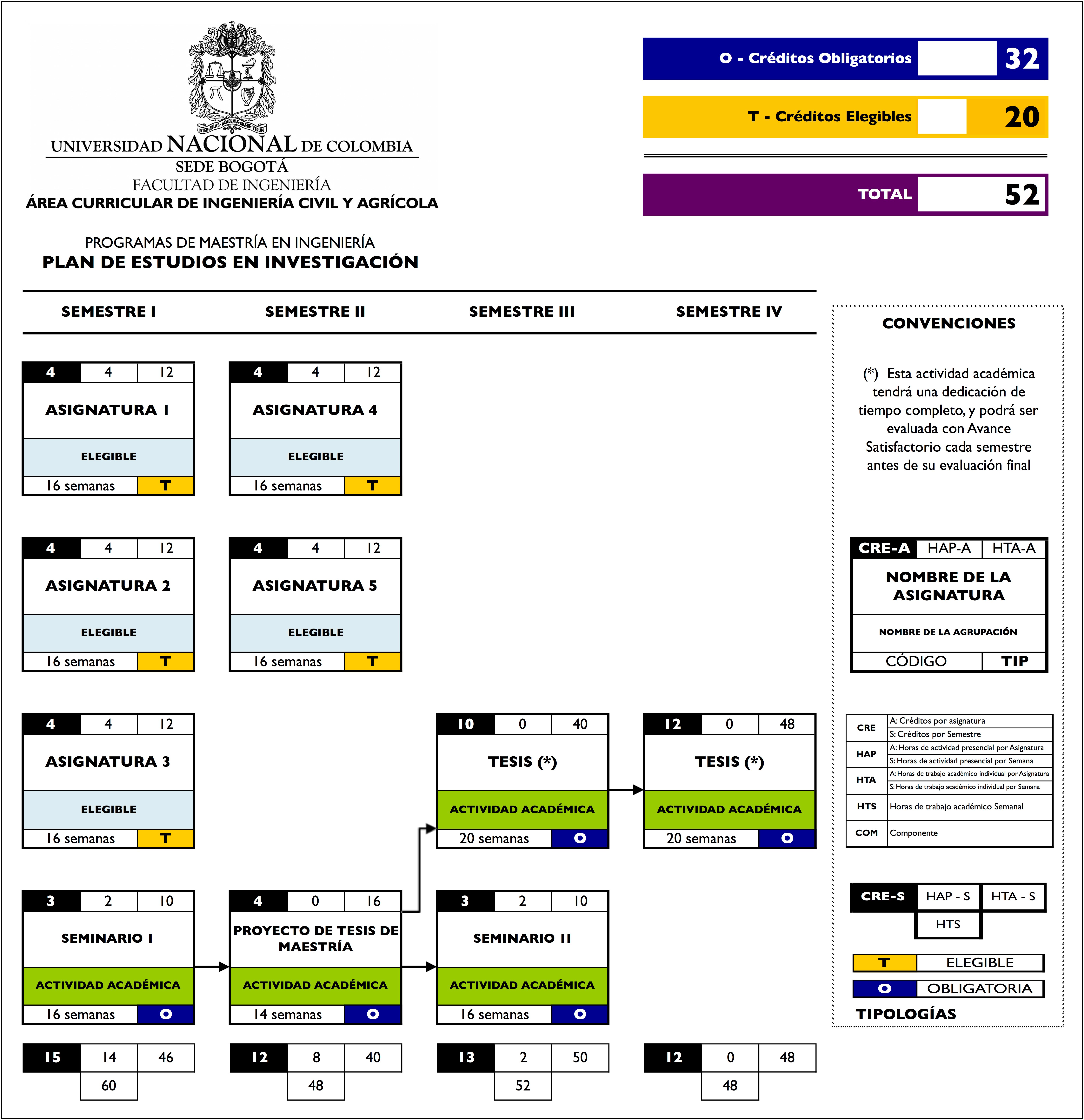
Objective
Types of subjects and distribution of academic credits
Academic Activities and Courses
Credits
Thesis
22
Thesis project
4
Research Seminars
6
Total Academic Activities
32
Eligible Subjects
20
Total Research credits
52
*The master's thesis is registered as a single 22-credit subject; however, it is recommended that it be developed over at least two semesters.
Master’s thesis Project
Thesis of Master’s Degree
SUBJECTS AND COURSES
SCHEDULE
LIST
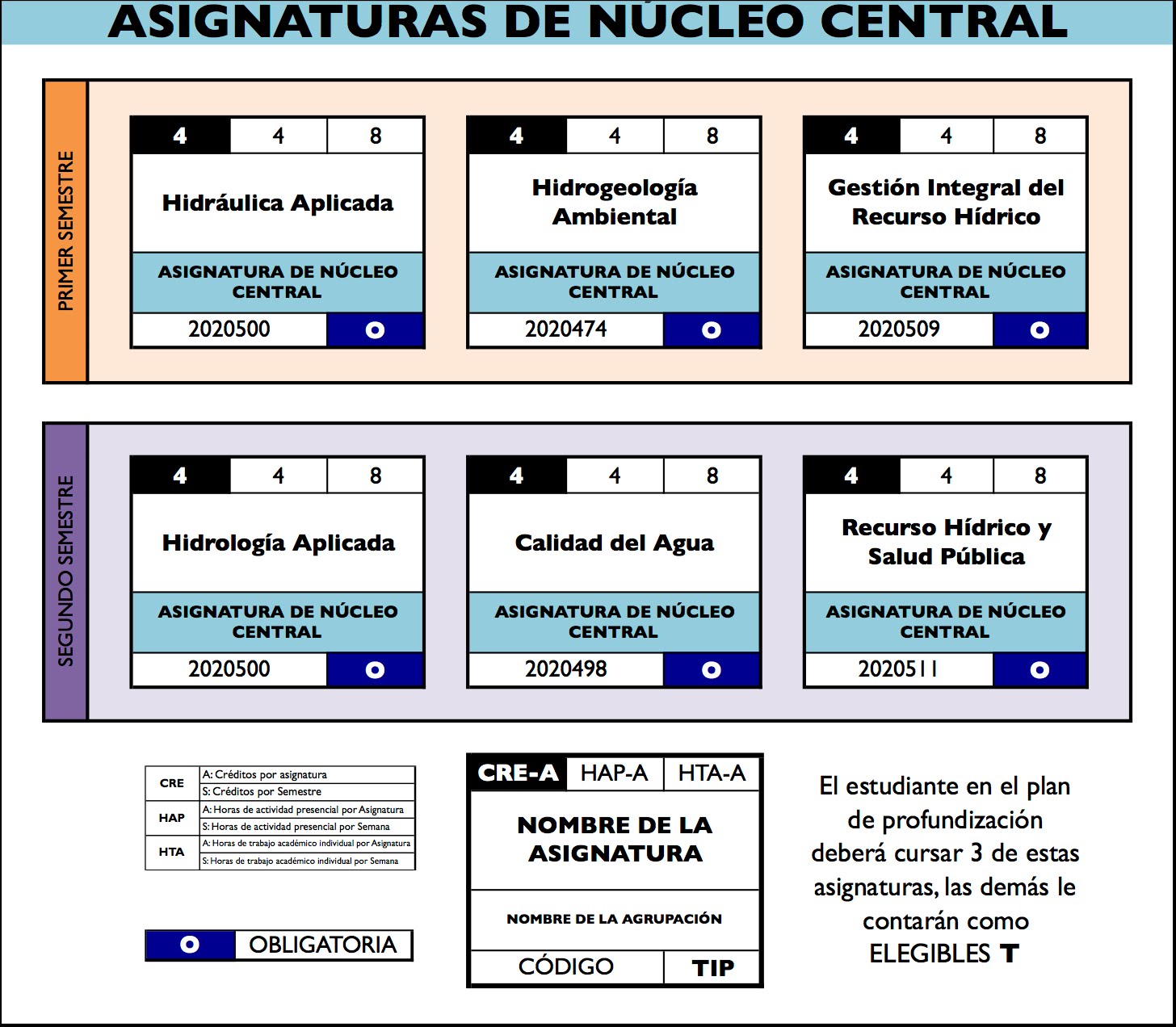
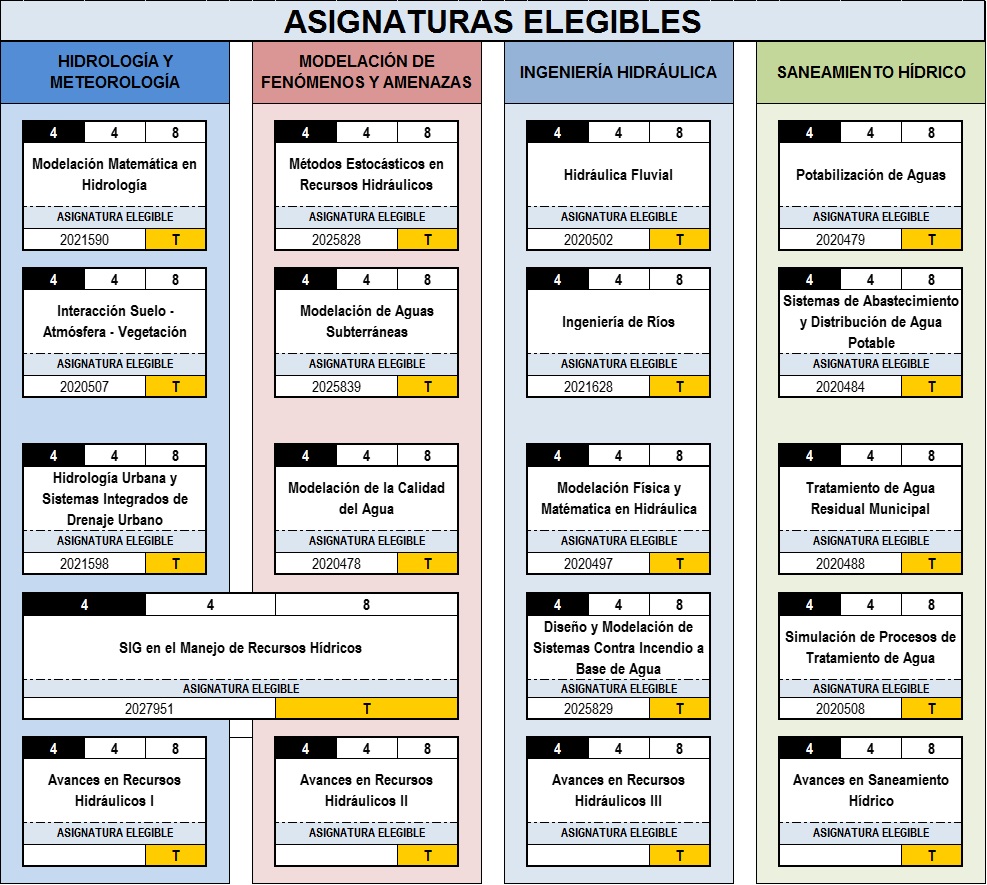
Obteniendo datos del Sistema de Información Acádemica SIA
TEACHING STAFF
NAME
SECTION
PROFESSOR'S SITE
Adiela Villarreal M.
Hydraulics
avillarrealme@unal.edu.co
Carlos A. Duarte A.
Hydraulics
caduartea@unal.edu.co
Carlos E. Cubillos
Hydraulics
cecubillosp@unal.edu.co
Carlos J. Collazos
Sanitation
cjcollazosc@unal.edu.co
Daniel A. Agudelo Q.
Sanitation
daagudeloq@unal.edu.co
Edgar L. Villarreal G.
Hydraulics
elvillarealg@unal.edu.co
Erasmo A. Rodríguez S.
Hydraulics
earodriguezs@unal.edu.co
Leonardo D. Donado G.
Hydraulics
lddonadog@unal.edu.co
Martha C. Bustos
Sanitation
mcbustosl@unal.edu.co
Nestor Alonso Mancipe Muñoz
Hydraulics
nmancipe@unal.edu.co
Rafael O. Ortiz M.
Hydraulics
roortizm@unal.edu.co
RESEARCH
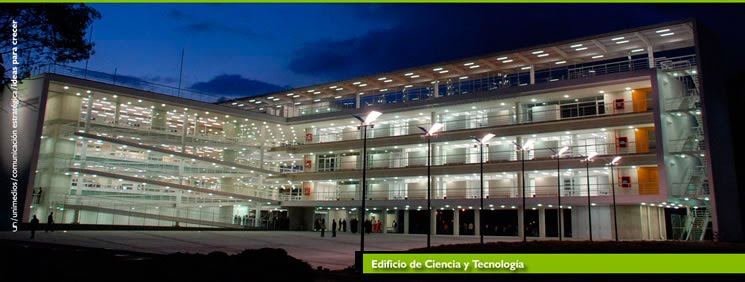
- Hydrology and meteorology.
- Hydraulic Engineering.
- Water sanitation.
- Planning, policy, information and environmental management of water resources.
- Modeling of natural phenomena and threats.
Research groups
Water Engineering Research Group (GIREH):
Resilience and Sanitation Research Group (RESA):
Research Group HYDS:
Laboratories
Laboratory of Hydraulic Engineering
Laboratory of Hydraulic Tests.
Laboratory of Environmental Engineering
ADMISSION PROCEDURE
Master's Degree in Engineering - Water Resources
Call for proposals 2020-02 - Research - In-Depth Study
NON-MASS ADMISSION PROCESS
PROCESO DE ADMISIÓN NO MASIVO
INSTRUCTIONS
- If you have completed undergraduate studies at Universidad Nacional de Colombia, you still have credits and are interested in obtaining the benefit to pursue postgraduate studies at the university, access this link for more information http://www.legal.unal.edu.co/rlunal/home/doc.jsp?d_i=36926
If you are a foreign student, click on the link for more information Aspirantes Extranjeros. We clarified that the certificates of admission / acceptance letters (if required) are issued only to applicants selected by the National University in the admissions process established.
STEP-BY-STEP GUIDE
- Pay registration fees from Thursday 1 October to Thursday 8 October 2020 until 3 p.m.
- Register online from Thursday 1 October to Thursday 8 October 2020 until 11.59 p.m.
- Fill out the web application for resumes and applicant supports: from Friday 9 October to Wednesday 21 October 2020 until 18:00. The information to access the web platform will be sent to the email address with which you formalized your registration in the admissions system.
- Application of initial tests: Essay on the project you wish to develop in your master's degree, in which the applicant includes an introduction, the idea to be developed, a critical analysis and/or discussion and conclusions. The essay should be no longer than 1 page, in any font, size 11 and single spaced, and should be sent to coocuprhi_fibog@unal.edu.co, by Thursday 21 October 2020 at the latest, until 6 p.m.
- Publication of initial test results: on Thursday 5 November 2020.
- Publication of summons to Interviews: on Friday 6 November 2020
- Interviews and Rating resumes: from Monday 9 November to Friday 13 November 2020 - virtual interview via Google Meet
- Publication of final admissions results: 19 November 2020
DOCUMENTOS REQUERIDOS
Los documentos señalados con (*) son opcionales. Sin embargo, esos soportes otorgan puntos dentro de la calificación de la hoja de vida, se recomienda adjuntarlos en caso de contar con ellos.
a) HOJA DE VIDA
- Documento de identificación.
- Tarjeta profesional
- Soportes de estudios universitarios:
- Acta de grado.
- Diploma.
- Certificado de notas.
- Documento legalizado mediante apostilla o delegación diplomática (en caso de títulos obtenidos en el extranjero).
- Certificado de culminación de estudios expedido por la institución donde desarrolló los estudios (para estudiantes que aún no tienen el título de pregrado).
- Reporte de Historia Académica (para los estudiantes de pregrado de la Universidad Nacional de Colombia con opción de grado de materias de posgrado).
- Distinciones Académicas*:
- Nombre de la distinción, institución que otorga, fecha en que se otorgó y adjuntar soporte.
- Experiencia Laboral*:
- Nombre de la institución o empresa, tipo de vinculación, fecha de inicio y de finalización(o en curso), cargo, función principal y adjuntar soporte.
- Experiencia Docente*:
- Nombre de la institución, dedicación, fecha de inicio y de finalización (o en curso), áreas de trabajo, información de asignaturas impartidas e intensidad de horas por semana y adjuntar soporte.
- Experiencia Investigativa*:
- Nombre de la investigación, institución, área del proyecto, entidad financiadora, funciones principales, fecha de inicio de vinculación y de finalización (o en curso), país y adjuntar soporte.
- Producción Intelectual*:
- Tipo de producción (artículo en revista indexada, libro, capítulo de libro, patente, software, planta piloto, diseño industrial, otra producción), datos de la producción y adjuntar soporte.
- Certificaciones de idioma*:
- No se exige acreditación de inglés como requisito en el proceso de admisión, sin embargo, adjuntar soporte si lo tiene.
- Referencias académicas o profesionales*:
- La aplicación web le solicitará los datos básicos de contacto de dos personas que realizarán el registro de 2 referencias académicas o profesionales según el perfil al que aspira (las referencias académicas aplican para el perfil de investigación, mientras que para el perfil de profundización aplican las referencias académicas o profesionales). La información diligenciada por las personas que usted indique es confidencial y será de conocimiento únicamente para las directivas del programa durante el proceso de evaluación de la admisión.
ADDITIONAL DOCUMENTS
- Attached document with letter of motivation from the applicant maximum one page.
- Attach a document (maximum 2500 characters, including spaces) in which the applicant proposes a topic to be developed in his/her final master's work.
NOTE: Those people who enter by early admission or automatic admission (National University of Colombia) must apply for the sending of documents in order to register their resume in the program.
FORMA DE RECEPCIÓN DE LA DOCUMENTACIÓN
- Adelantar el proceso de cargue de documentos con anterioridad a la fecha de cierre.
- Verificar que cuente con todos los documentos requeridos, cada uno en formato PDF(únicamente) y que no exceda el tamaño de 10MB.
- Disponer de tiempo suficiente para efectuar el cargue de los documentos. El cargue de los documentos puede hacerlo por partes, cerrando sesión cada vez que termine de cargar cada parte de la documentación solicitada.
- Los documentos relacionados con un (*) son opcionales, los demás son obligatorios.
- Para realizar cambios en los documentos que ha cargado previamente, debe cargar el nuevo documento y guardar los cambios. El nuevo documento reemplazará el cargado previamente.
- El aplicativo mediante un menú indica la cantidad de registros cargados en cada sección y señala en color rojo la sección en la cual no hay soportes cargados.
- Contactar previamente a las personas que relacionará como referencias, y asegurarse que ingresen las recomendaciones dentro del plazo establecido.
- Al finalizar de cargar la totalidad de la documentación, bastará con cerrar sesión para guardarla. Esta información quedará almacenada y será enviada automáticamente a los evaluadores después del cierre del aplicativo.
ADMISSION CRITERIA
Component
Weighting
Qualifying
Minimum approval score
Curriculum Vitae
30
No
-
Exams
30
Sí
3.0/5.0
Interview
40
No
-
TOTAL
100
3.0 over 5.0
CV Assessment criteria
Evaluation criteria Eliminating tests
- Structure of the essay
- Writing, Spelling and Grammar
- Critical analysis and discussion
- Relevance of the essay with respect to the topics offered in this call
Interview Assessment Criteria
Topics and quotas offered
| QUOTAS OFFERED MASTER'S DEGREE IN WATER RESOURCES | ||||
|---|---|---|---|---|
| Research Line | Available professor | Quotas | Candidate Profile | Topic of research to be developed |
| Modeling of natural phenomena and hazards | Leonardo David Donado Garzón | 1 | Research profile | Hydraulic tests in heterogeneous aquifers: Case study of the Middle Magdalena Valley. |
| 1 | Research profile | Base flow analysis in large tropical streams and their tributaries: Case study of the Middle Magdalena Valley. | ||
| 1 | Research profile | Approximation to the definition of a usable aquifer according to the hydrochemical and geological characterization of the country, for the activities of underground injection of fluids from the hydrocarbon industry and the sequestration of CO2. | ||
| 1 | Research profile | Evaluation of the Estimated Recharge by Different Hydrological Models | ||
| Néstor Alonso Mancipe Muñoz | 1 | Research profile | Evaluation of environmental sensors to support water resource monitoring and modelling | |
| 1 | Research profile | Eco-hydraulic modeling for the analysis of pollutant assimilation in rivers | ||
| Hydrology and meteorology | Leonardo David Donado Garzón | 1 | Research profile | Development of regional climate change scenarios for the Middle Magdalena Valley |
| 1 | Research profile | Ecohydrological modeling as a response to water-soil-vegetation-atmosphere interaction using remote sensing tools: a case study in the northern zone of the Middle Magdalena Valley | ||
| Hydraulic Engineering | Carlos Eduardo Cubillos Pena | 2 | Deepening profile | River hydraulics, river engineering, navigation, surface hydrology, general hydraulics or history of river engineering in Colombia |
| Environmental Sanitation | Martha Cristina Bustos López | 1 | Research profile | Removal of emerging contaminants from wastewater |
| 1 | Deepening profile | Water reuse | ||
| Carlos Julio Collazos Chávez | 2 | Deepening profile | Wastewater treatment | |
| Water Resources Planning, Policy, Information and Environmental Management | Gabriela Arrieta Loyo | 1 | Deepening profile | Water Resource Management and Circular Economy of Wastewater |
Minimum admission score
CONTACT
Coordinator: Nestor Alonso Mancipe Muñoz
Email: nmancipe@unal.edu.co - coocuprhi_fibog@unal.edu.co
Telephone: (+57) (1) 3165000 Ext. 13471
Address: Av. NQS (Carrera 30), 45-03, Campus Ciudad Universitaria – Laboratory of Hydraulics, 3rd Floor
Curricular area: Civil and Agricultural Engineering
Director: Caori Patricia Takeuchi Tam
Teléfono: (+57) (1) 3165000 Ext. 13663
Email: diracica_fibog@unal.edu.co




